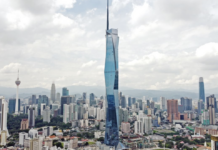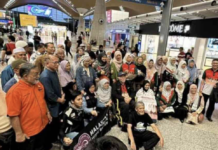KUALA LUMPUR, Oct 11 — Experts have called on corporate bodies and non-governmental organisations (NGOs) to lend their support in terms of financial means as well as guidance in helping to create a more comfortable and conducive low-cost housing environment.
Universiti Teknologi Malaysia (UTM) Senior Lecturer Dr Wan Nurul Mardiah Wan Mohd Rani said such support is important to create community spaces that enable social activities and interactions in the housing area that predominantly occupied by low-income households (B40).
“For example, empty areas such as foyers on the ground floor (of an apartment) can be utilised and upgraded into a multipurpose space that can serve as a venue to carry out various beneficial activities such as group learning.
“However, the efforts may be hampered by the lack of awareness and knowledge among resident as well as financial constraints,” she told Bernama.
The sustainable urbanisation expert said, creating such space is also crucial particularly in the face of COVID-19 that requires people to stay at home, which for the B40 families, is often cramped and uncomfortable.
Wan Nurul Mardiah, who is also the Deputy Director of a profit-free research and development company, the UTM Sultan Iskandar Institute, said for that purpose, the institute could be a facilitator to help improve the quality of the environment, which is key to successful social development.
“Institut Sultan Iskandar UTM is always looking for opportunities to work together with any corporate body and NGO to get support from them in terms of providing funds and skills guidance.
“It is also part of the corporate social responsibility of all parties in ensuring every walk of life has a comfortable place to live,” she said.
Echoing the same sentiment, Malaysian Urban Design Association president Dr Shuhana Shamsuddin is of the view that there is still a lack of awareness of maintenance culture among the society and the authorities.
She said residents’ associations should also be more proactive in creating a more conducive residential outdoor environment.
“Residents themselves should also play a role, not just sit still and wait for the authorities to make a move to ensure that their housing area is frequently maintained and cleaned.
“Continuous maintenance is also important, sometimes existing facilities such as children’s playground cannot be used due to faulty equipment and unsafe conditions.
“The same goes for repainting, it should be carried out periodically, for example, every two years especially for public housing, because over time, the colours of the paint will fade away making a building looks unattractive,” she said.
Besides that, Shuhana said the waste management system at these housings has also been taken lightly even though improper waste disposal can adversely affect the environment.
“In terms of environmental psychology, frequent exposure to a dirty environment will lead to environmental numbness syndrome which causes a person to have the ‘I don’t care’ attitude and lose their sense of pride to their environment,” she said.
The UTM adjunct professor said the current COVID-19 situation should also serve as an eye-opener to the society on the importance of having a clean and well-kept residence.
“As we can see during the enforcement of the Movement Control Order, it is important for everyone to have access to open spaces and green environment because it has a huge influence on psychology and social development,” she added.



















